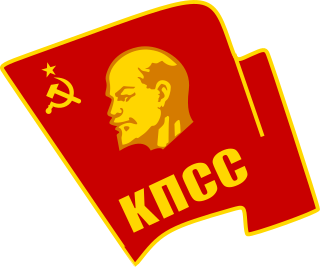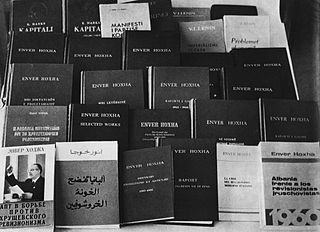Related Research Articles

The Communist Party of the Soviet Union (CPSU), also known by various other names during its history, was the founding and ruling party of the Soviet Union. The CPSU was the sole governing party of the Soviet Union until 1990 when the Congress of People's Deputies modified Article 6 of the 1977 Soviet Constitution, which had previously granted the CPSU a monopoly over the political system.
Marxism–Leninism is an authoritarian communist ideology which was the main communist movement throughout the 20th century. It was the state ideology of the Soviet Union, its satellite states in the Eastern Bloc, and various countries in the Non-Aligned Movement and Third World during the Cold War, as well as the Communist International after Bolshevisation. Today, Marxism–Leninism is the ideology of several communist parties, despite the de-Leninization that followed the dissolution of the USSR, and remains the official ideology of the ruling parties of China, Cuba, Laos, and Vietnam as one-party socialist republics, and of Nepal in a multiparty democracy. Marxist–Leninist states have been commonly referred to by Western academics as "Communist states".

Vyacheslav Mikhaylovich Molotov was a Russian politician and diplomat, an Old Bolshevik, and a leading figure in the Soviet government from the 1920s onward. He served as Chairman of the Council of People's Commissars from 1930 to 1941 and as Minister of Foreign Affairs from 1939 to 1949 and from 1953 to 1956.

Mikhail Ivanovich Kalinin, known familiarly by Soviet citizens as "Kalinych", was a Soviet politician and Old Bolshevik revolutionary. He served as head of state of the Russian Soviet Federative Socialist Republic and later of the Soviet Union from 1919 to 1946. From 1926, he was a member of the Politburo of the Communist Party of the Soviet Union.

Anastas Ivanovich Mikoyan was an Armenian Communist revolutionary, Old Bolshevik and Soviet statesman. He was the only Soviet politician who managed to remain at the highest levels of power within the Communist Party, as that power oscillated between the Central Committee and the Politburo. His tenure extended from the latter days of Lenin and lasted through to the eras of Stalin and Khrushchev, until his peaceful retirement under Brezhnev.

An index of articles related to the former nation known as the Soviet Union. It covers the Soviet revolutionary period until the dissolution of the Soviet Union. This list includes topics, events, persons and other items of national significance within the Soviet Union. It does not include places within the Soviet Union, unless the place is associated with an event of national significance. This index also does not contain items related to Soviet Military History.
Kommunistiska Partiet i Sverige was a pro-Albanian communist party in Sweden. KPS was formed in 1982. It was dissolved in 1993.
The history of the Communist Party of the Soviet Union was generally perceived as covering that of the Bolshevik faction of the Russian Social Democratic Labour Party from which it evolved. The date 1912 is often identified as the time of the formation of the Communist Party of the Soviet Union as a distinct party, and its history since then can roughly be divided into the following periods:
The Sino-Albanian split was the gradual worsening of relations between the People's Socialist Republic of Albania and the People's Republic of China in the period 1972–1978. Both countries had supported each other in the Soviet–Albanian and Sino-Soviet splits, together declaring the necessity of defending Marxism–Leninism against what they regarded as Soviet revisionism within the international communist movement. By the early 1970s, however, Albanian disagreements with certain aspects of Chinese policy deepened as the visit of Nixon to China along with the Chinese announcement of the "Three Worlds Theory" produced strong apprehension in Albania's leadership under Enver Hoxha. Hoxha saw in these events an emerging Chinese alliance with American imperialism and abandonment of proletarian internationalism. In 1978, China broke off its trade relations with Albania, signalling an end to the informal alliance which existed between the two states.

Vlas Yakovlevich Chubar was a Ukrainian Bolshevik revolutionary and a Soviet politician. Chubar was arrested during the Great Terror of 1937-38 and executed early in 1939.
Communism is a far-left philosophical, social, political, and economic ideology and movement whose goal is the establishment of a communist society, namely a socioeconomic order based on the idea of common ownership of the means of production, distribution, and exchange—allocating products to everyone in the society. It involves the absence of social classes, money, and the state. Communism, while sometimes used as a synonym of socialism, is mainly a specific, yet distinct, form of socialism. Communists often seek a voluntary state of self-governance, but disagree on the means to this end. This reflects a distinction between a more libertarian approach of communization, revolutionary spontaneity, and workers' self-management, and a more vanguardist or communist party-driven approach through the development of a constitutional socialist state followed by Friedrich Engels' withering away of the state.

The 17th Congress of the All-Union Communist Party (Bolsheviks) was held during 26 January – 10 February 1934. The congress was attended by 1,225 delegates with a casting vote and 736 delegates with a consultative vote, representing 1,872,488 party members and 935,298 candidate members.
Grover Carr Furr III is an American professor of Medieval English literature at Montclair State University. He has published several historical revisionist books and papers about Soviet history, especially the Stalin era. He claimed that the Holodomor was a hoax invented by Ukrainian Nazi collaborationists, that the Katyn massacre was committed by the Nazi Schutzstaffel and not the Soviet NKVD, that all defendants in the Moscow Trials were guilty as charged, that Nikita Khrushchev's speech "On the Cult of Personality and Its Consequences" about Stalinist repression was full of lies, that the purpose of the Molotov–Ribbentrop Pact was to preserve the Second Polish Republic and not to attack it, and that the Soviet Union did not invade Poland in September 1939.

The Albanian–Soviet split was the gradual deterioration of relations between the Union of Soviet Socialist Republics (USSR) and the People's Republic of Albania, which occurred in the 1955–1961 period as a result of Soviet leader Nikita Khrushchev's rapprochement with Yugoslavia along with his "Secret Speech" and subsequent de-Stalinization, including efforts to extend these policies into Albania as was occurring in other Eastern Bloc states at the time.

Within the Marxist movement, revisionism represents various ideas, principles and theories that are based on a significant revision of fundamental Marxist premises that usually involve making an alliance with the bourgeois class.
"On the Cult of Personality and Its Consequences", popularly known as the "Secret Speech", was a report by Soviet leader Nikita Khrushchev, First Secretary of the Communist Party of the Soviet Union, made to the 20th Congress of the Communist Party of the Soviet Union on 25 February 1956. Khrushchev's speech was sharply critical of the rule of the deceased General Secretary and Premier Joseph Stalin, particularly with respect to the purges which had especially marked the last years of the 1930s. Khrushchev charged Stalin with having fostered a leadership cult of personality despite ostensibly maintaining support for the ideals of communism. The speech was leaked to the West by the Israeli intelligence agency Shin Bet, which received it from the Polish-Jewish journalist Wiktor Grajewski.

Hoxhaism is a variant of anti-revisionist Marxism–Leninism that developed in the late 1970s due to a split in the anti-revisionist movement, appearing after the ideological dispute between the Chinese Communist Party and the Party of Labour of Albania in 1978. The ideology is named after Enver Hoxha, a notable Albanian communist leader, who served as the First Secretary of the Party of Labour.
The 20th Congress of the Communist Party of the Soviet Union was held during the period 14–25 February 1956. It is known especially for First Secretary Nikita Khrushchev's "Secret Speech", which denounced the personality cult and dictatorship of Joseph Stalin.
Anti-revisionism is a position within Marxism–Leninism which emerged in the 1950s in opposition to the reforms of Soviet leader Nikita Khrushchev. Where Khrushchev pursued an interpretation that differed from his predecessor Joseph Stalin, the anti-revisionists within the international communist movement remained dedicated to Stalin's ideological legacy and criticized the Soviet Union under Khrushchev and his successors as state capitalist and social imperialist.
The anti-Stalinist left is an umbrella term for various kinds of left-wing political movements that opposed Joseph Stalin, Stalinism and the actual system of governance Stalin implemented as leader of the Soviet Union between 1927 and 1953. This term also refers to the high ranking political figures and governmental programs that opposed Joseph Stalin and his form of communism, like Leon Trotsky and other left wing traditional Marxists.
References
- ↑ Jacobsson, Benny. Sovjetunionen idag - Kritik av KPML(r):s prosovjetiska politik. Stockholm: Kommunistiska Arbetarförlaget, 1984. p. 106.
- 1 2 Jacobsson, Benny. Sovjetunionen idag - Kritik av KPML(r):s prosovjetiska politik. Stockholm: Kommunistiska Arbetarförlaget, 1984. p. 114.
- ↑ Jacobsson, Benny. Sovjetunionen idag - Kritik av KPML(r):s prosovjetiska politik. Stockholm: Kommunistiska Arbetarförlaget, 1984. p. 88.
- ↑ LIBRIS [ permanent dead link ]
- ↑ See for example this document Archived April 30, 2006, at the Wayback Machine
- ↑ A document produced by the Central Committee of the PLA in 1972 stated "In this grave situation created by N. Khrushchev's betrayal the time has come for you Soviet communists to perform your lofty revolutionary duty towards your glorious party, people and country, towards the proletariat and peoples of the whole world, not to allow the treacherous Khrushchevite clique to jeopardize the future of socialism and communism. The Soviet revolutionary communists have never sat back on the strength of their traditions and merits of the past. Today more than ever before these traditions should be reasserted in the same revolutionary spirit, with the same determination and devotion to principle, to defend the glorious name of the Communist Party of the Soviet Union, to raise high its revolutionary banner, flung to the ground by N. Khrushchev." Source: "Reject the Revisionist Thesis of the XX Congress". Archived from the original on 2016-04-22. Retrieved 2006-11-10.
- ↑ Note de l’éditeur, Proclamation-Programme des Communistes (Bolcheviques) Révolutionnaries Soviétiques [ dead link ]